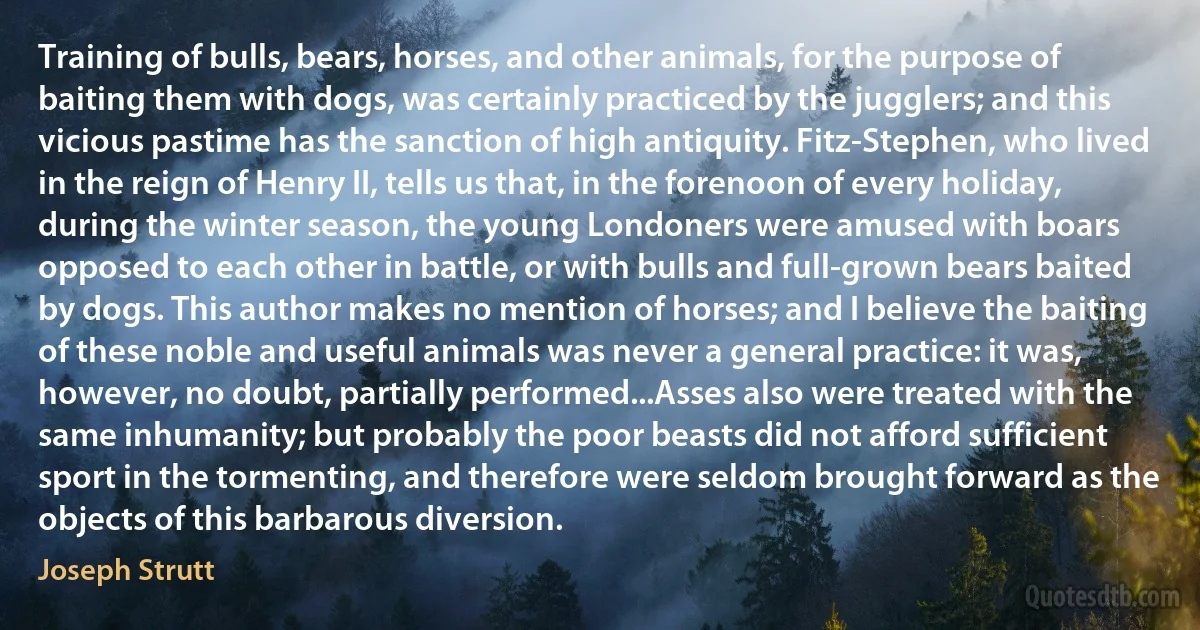
Training of bulls, bears, horses, and other animals, for the purpose of baiting them with dogs, was certainly practiced by the jugglers; and this vicious pastime has the sanction of high antiquity. Fitz-Stephen, who lived in the reign of Henry II, tells us that, in the forenoon of every holiday, during the winter season, the young Londoners were amused with boars opposed to each other in battle, or with bulls and full-grown bears baited by dogs. This author makes no mention of horses; and I believe the baiting of these noble and useful animals was never a general practice: it was, however, no doubt, partially performed...Asses also were treated with the same inhumanity; but probably the poor beasts did not afford sufficient sport in the tormenting, and therefore were seldom brought forward as the objects of this barbarous diversion.
Joseph StruttRelated topics
battle believe doubt forward general high holiday inhumanity mention noble pastime poor practice purpose sanction season sport winter young dogsRelated quotes
Some young men could not afford to marry or were statutorily forbidden to do so, and then their visits to Japanese brothels engendered guilt as well as VD. The official attitude to taking brown mistresses was always ambivalent. It let the side down, but a sleeping dictionary was the only way to learn the language. Mr Butcher is good on all this, and he gives such tables as one headed ‘Ethnicity of Women from whom European Men Treated at the Sultan Street Clinic Contracted Venereal Disease, 1927-1931.' The girls of Siam were the great infectresses, but the Malays came a close second. The Japanese, who had regular medical inspections and lived in brothels cleaner than hotels, were down with the Eurasians to 0.4% in 1931. This damnable sex, by no means to be tamed by quinine or cricket. Guilt guilt guilt....

Anthony Burgess
Every development of truths which relate to human nature, and more especially its active manifestations, is attended with a wish to see worked out in practice what theory has shown us to be just and good. To man, whose mind is seldom satisfied with the calmly beneficent influence of abstract ideas, this desire is perfectly natural, and it increases in liveliness with the spirit of benevolent sympathy in social happiness and well-being. But, however natural in itself, and however noble in its origin, this desire has not unfrequently led to hurtful consequences,-nay, often to greater evils than the colder indifference, or (as from the very opposite cause the same effect may follow) the glowing enthusiasm, which, comparatively heedless of reality, delights only in the pure beauty of ideas.

Wilhelm von Humboldt
My present opinion favors the following disposition of the troops for winter-quarters. The garrison here should consist of Patterson's, Learned's, Clinton's, and the North Carolina brigades, which, I believe, will forma force sufficient for the purpose. If the horse is posted in Connecticut, as seems to be thought on, I think the troops coming from Rhode Island, in con junction with the horse, will form a sufficient covering party for the exposed parts of Connecticut and Westchester. I would only wish Clinton's brigade to be here, because it may interest the inhabitants to furnish supplies in the winter, and to encourage the militia to turn out with spirit, should the enemy make a sudden move towards the post. The connection between the army and country will have an influence in both these respects.

Nathanael Greene
The Managers of that Trade themselves, and others, testify, that many of these African nations inhabit fertile countries, are industrious farmers, enjoy plenty, and lived quietly, averse to war, before the Europeans debauched them with liquors, and bribing them against one another; and that these inoffensive people are brought into slavery, by stealing them, tempting Kings to sell subjects, which they can have no right to do, and hiring one tribe to war against another, in order to catch prisoners. By such wicked and inhuman ways the English are said to enslave towards one hundred thousand yearly; of which thirty thousand are supposed to die by barbarous treatment in the first year; besides all that are slain in the unnatural wars excited to take them. So much innocent blood have the Managers and Supporters of this inhuman Trade to answer for to the common Lord of all!

Thomas Paine
America is actually the country to which people came in the most of a hurry, to try and find if that life could really be lived as a society. Some of them came to practice their religion freely. Many came to escape from persecution by other religions. Some came to be free from religion altogether, and that's why the Constitution is godless and doesn't mention the word, but it was not written by atheists. It was written by democratic theists and secularists, and that's why the meeting at Philadelphia, which decided these matters and decides them still for us, was a godless one, if not an atheist one. And that's why I think modern America should be a lot more anti-religious than it is. It should pay less respect, and make much less reverence toward religion, than its mass media... presently do.

Christopher Hitchens
